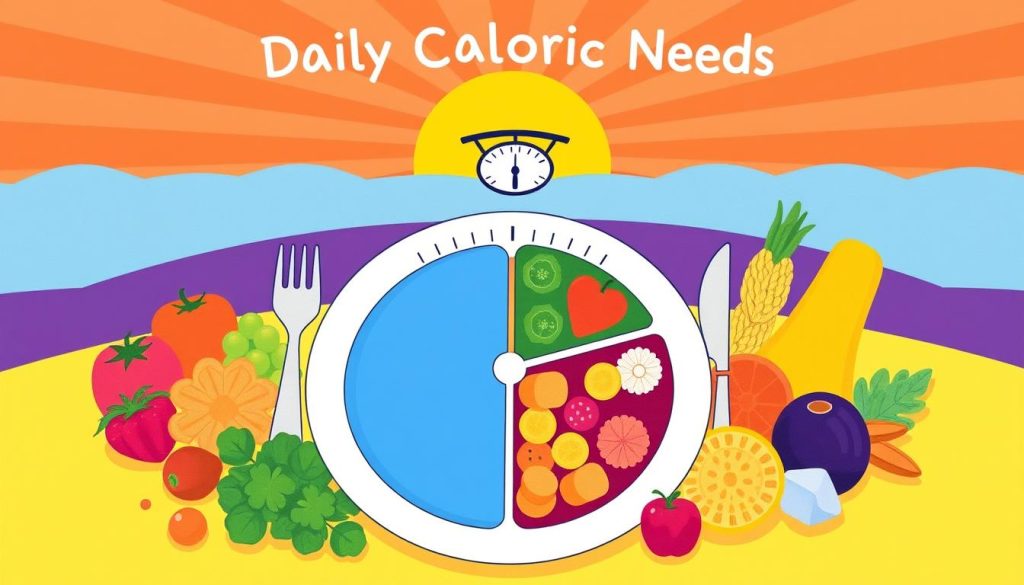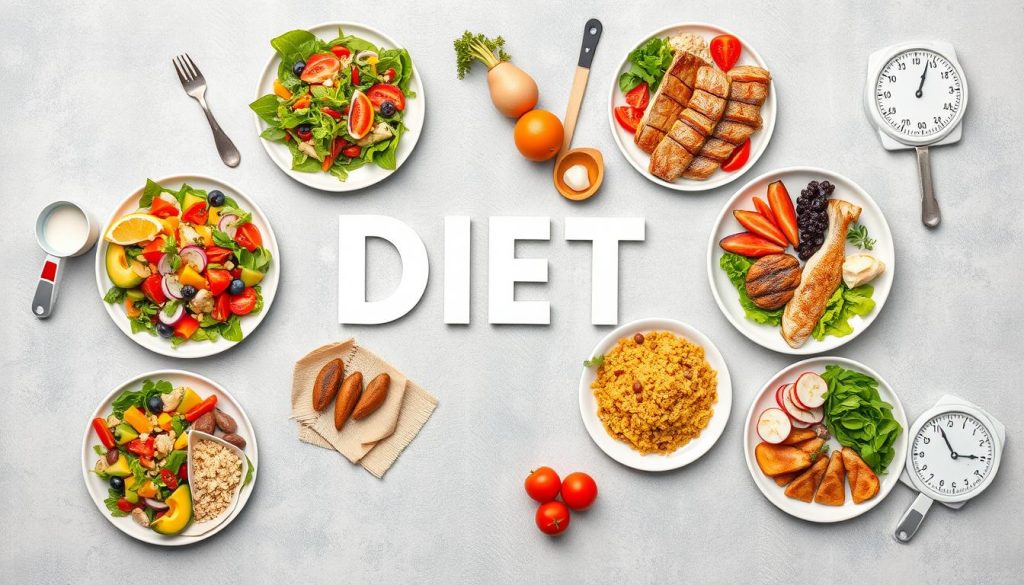The idea of energy intake is key to knowing about dietary habits, health, and nutrition. When we talk about what our bodies need to work right, we often use calories and kilocalories. Many think these are very different, but it’s really about size and how we talk about them.
As we dive into this, we’ll learn about these energy units. We’ll see how they help us balance what we eat and burn, which is important for managing our weight.
This first look aims to explain how our daily energy intake affects our health. It’s important for anyone who cares about their health or fitness to understand calories and kilocalories. Knowing this will help us make better choices about what we eat and improve our overall health.
Whether you want to lose weight, build muscle, or stay healthy, knowing about these energy units matters. It will change how you think about your food choices.
What Are Calories and Their Role in Nutrition?
Calories are key to understanding fitness and nutrition. They measure energy, vital for keeping our bodies in balance. Whether you aim to lose weight, build muscle, or stay healthy, knowing about calories is essential. It’s a basic part of nutritional science and managing calorie intake.
Defining Caloric Value in Foods
Different foods have different energy levels. The amount of energy in food depends on its nutritional makeup. Proteins, carbs, and fats have unique energy values. Knowing this helps in planning diets and keeping energy levels right.
How Calories Fuel the Human Body
Food calories give us the energy for daily activities and body functions. Our bodies turn these calories into fuel for all bodily processes and physical activities. It’s important to manage calorie intake well to stay energized and healthy.
It’s all about balancing the calories we eat with the ones we burn. This balance is key for managing weight and preventing diseases like diabetes and heart disease. It shows how important calorie intake is for our long-term health.
Fundamental Differences Between Calories and Kilocalories
When we talk about nutrition facts and dietary energy, it’s key to know the terms used. Many don’t realize that “calorie” in food talk really means kilocalorie. This part explains the science behind these terms and clears up some common mistakes.
Breaking Down the Terminology: Cal vs. kcal
A calorie (cal) is the energy to warm 1 gram of water by 1°C. But, a kilocalorie (kcal) is the energy to warm 1 kilogram of water by 1°C. Dietitians and labels use “calorie” to mean kilocalorie. This mix-up is common and can mess up how we track our energy intake.
Common Misconceptions Clarified
Many get confused thinking food labels’ calorie counts are kilocalories. So, when a label says 200 calories, it really means 200 kilocalories. Knowing this can change how we manage our diet. Here’s a table to help you understand these values better:
| Label Reading | Interpretation | Common Misinterpretation |
|---|---|---|
| 250 Calories | 250 kcal | 250,000 cal |
| 500 Calories | 500 kcal | 500,000 cal |
| 100 Calories | 100 kcal | 100,000 cal |
Understanding Caloric Intake for Weight Management
Managing calories is key for weight loss and weight gain. Knowing how to count calories helps in managing weight better. It’s about finding the right balance between what you eat and how much you burn.
To lose weight, you need to eat fewer calories than you burn. For gaining weight, you should eat more calories than you burn.
Calorie counting helps track what you eat. It’s not just about numbers; it’s about knowing the food’s nutritional value. Portion control and diet quality are very important:
- Eating foods rich in nutrients but low in calories improves your diet.
- Watching your portion sizes helps keep your calorie intake right.
Effective calorie management is about smart eating, staying active, and tracking calories. Use tools that fit your needs and goals.
The Mechanics of Calorie Counting
Learning to count calories is key for managing your diet. It helps keep your weight healthy and lets you make smart food choices. With the right tools and knowledge, tracking calories becomes easy and helpful, making it a part of your daily life.
Tools for Accurate Calorie Tracking
There are many digital tools and resources to help with calorie counting. Apps and wearable devices give you real-time data on your eating habits. They have big databases of nutritional info, making it easy to log your meals accurately.
- Mobile Apps: They track your daily food and total calories.
- Wearable Technology: These devices connect with apps to show your calorie balance.
- Online Calorie Calculators: Quick tools for checking meal calories.
Interpreting Nutrition Labels
Reading food labels is important for managing calories. Labels give you detailed info on what’s in your food. This helps you choose healthier options and track your calories better.
By focusing on these label details, you can stick to your diet goals. Learning to read labels helps you control your nutrition. This leads to better health and more awareness of what you eat.
Measuring Calorie Expenditure Through Different Activities
It’s important to know how different physical activities affect calorie expenditure. This is key for anyone trying to keep their weight in check through exercise. We’ll explore how the intensity and type of activity relate to the energy burned.
Many activities can impact calorie expenditure, from daily tasks to structured workouts. Here’s how different activities can help burn energy.
- Low-intensity activities: Like walking, doing chores, or gentle stretching, burn fewer calories per minute. But, they add up over time.
- Moderate-intensity activities: Brisk walking, biking, or doubles tennis increase calorie expenditure. They also offer great health benefits.
- High-intensity activities: Running, swimming laps, or playing competitive sports burn lots of calories quickly. They can change your fitness and body shape.
Understanding the effects of these activities is key to balancing calorie expenditure and intake. This balance is vital for reaching fitness goals. Whether it’s adding moderate activities to your day or doing intense workouts, each plays a big role in burning energy. This affects how well your body uses calories.
How to Use a Calorie Calculator Effectively
Learning to use a calorie calculator can really help with your diet. It gives you exact numbers for how many calories you need. This is key for anyone wanting to manage their diet well.
Understanding the Inputs and Outputs
Getting the right info into a calorie calculator is key. You need to know your age, weight, height, sex, and how active you are. These details help figure out how many calories you burn each day.
The calculator then tells you how many calories you need to eat. This can help you lose, gain, or keep your weight as you want.
Choosing the Right Calculator for Your Needs
Finding the right calorie calculator is important. It depends on what you want to achieve, like losing weight or gaining muscle. The right tool can really help with your diet.
Here’s a look at some popular calorie calculators and what they’re good for:
| Calorie Calculator | Features | Best for |
|---|---|---|
| MyFitnessPal | Comprehensive food database, barcode scanner, recipe importer | Everyday tracking and macro counting |
| Fitbit App | Integration with fitness tracker, personalized meal plans | Fitness enthusiasts |
| Cronometer | Detailed nutrient tracking, biometric data inputs | Nutrient-focused users |

In short, a calorie calculator helps you plan your diet well. It gives you the right numbers for your needs. By knowing what to put in and choosing the right tool, you can reach your diet and health goals.
Impact of Macronutrients on Caloric Value
Knowing how macronutrients affect calorie intake is key for good nutrition planning. Carbohydrates, proteins, and fats each play a role in our diet’s calorie count. This affects our health and energy levels.
Balancing Carbs, Proteins, and Fats
The right mix of carbs, proteins, and fats is vital for health and performance. A balanced diet helps with weight control and building muscle.
- Carbohydrates should be 45-65% of your calories.
- Proteins, important for repair and growth, should be 10-35% of calories.
- Fats, key for hormones and vitamin absorption, should be 20-35% of your diet.
Calculating Caloric Content from Macronutrients
When planning meals, think about the calories each macronutrient adds. Knowing how grams of each macronutrient turn into calories helps with precise nutrition planning.
| Macronutrient | Calories per Gram |
|---|---|
| Carbohydrates | 4 |
| Proteins | 4 |
| Fats | 9 |
This table is a quick guide for calculating calories from different macronutrients.
Calories and Kilocalories: Gauging Your Daily Needs
Knowing your daily caloric requirements is key to staying healthy. This part talks about how age, gender, weight, and activity level affect your energy needs. It also shows how to use nutrition guidelines to fit your diet to your health goals.

Every person’s energy needs are different. They depend on how active you are, your metabolism, and your health. Figuring out how many calories you need each day is the first step to better eating habits.
- Age: Younger people need more calories because they grow fast and have a higher metabolism.
- Gender: Men usually need more calories because they have more muscle.
- Weight: Heavier people need more calories to keep their weight up.
- Activity Level: The more active you are, the more calories you burn. Athletes, for example, might need to eat more to keep their energy up.
Looking at nutrition guidelines can help you figure out how many calories you should eat. Then, adjust based on your personal needs and goals. Think about your health goals, lifestyle changes, and your environment to fine-tune your nutrition. This helps support your overall health.
| Factor | Low Energy Needs | High Energy Needs |
|---|---|---|
| Age | 65+ | 16-25 |
| Gender | Female | Male |
| Weight | Under 125 lbs | Over 185 lbs |
| Activity Level | Sedentary | Highly Active |
By understanding these factors, you can figure out your personal daily caloric requirements. This helps you manage your diet better. It not only helps you keep a healthy weight but also boosts your energy and overall well-being.
Decoding the Calorie Tracker: How Technology Aids Nutrition
In today’s world, calorie tracking technology is key for better health and smart nutrition choices. These tools use smart algorithms and easy-to-use interfaces. They help with diet monitoring by giving personalized diet plans and useful tips.
Calorie tracking technology has given people the tools to watch their calorie intake closely. It makes tracking meals easier and more accurate. This tech helps in keeping a close eye on what we eat.
- Instantaneous food tracking
- Real-time nutritional feedback
- Integration with fitness devices
Also, linking smart nutrition apps with wearables has changed diet tracking on the move. These devices can track our activities and adjust our calorie needs.
| Feature | Benefits |
|---|---|
| Automated meal logging | Saves time and improves data accuracy |
| Integration with wearables | Tracks physical activity and adjusts caloric intake needs |
| Customized nutrition plans | Supports personal health goals and dietary restrictions |
The world of calorie tracking technology is always changing. It helps with personal health and understanding nutrition better. As these technologies get better, they will be more important for diet and nutrition in the future.
Physical Exercise and Its Effect on Calorie Expenditure
Physical activities boost well-being and increase calorie burn. Knowing how different exercises use energy helps improve workout efficiency. This section covers how to track calorie burn and plan workouts for better results.
Calculating Calories Burned During Various Exercises
It’s important to track calories burned during workouts. The table below shows how many calories different exercises burn in 30 minutes. It helps with planning effective exercise.
| Exercise | Calories Burned Per 30 Minutes | Intensity Level |
|---|---|---|
| Running (5 mph) | 295 | Moderate |
| Swimming (laps) | 255 | Moderate |
| Cycling (12-13.9 mph) | 240 | Low-Moderate |
| Hiking | 215 | Low |
| Strength Training | 180 | Low-Moderate |
Adjusting Workouts to Maximize Caloric Burn
To boost workout efficiency, change your workout’s type, length, and intensity. High-Intensity Interval Training (HIIT) is great for burning calories during and after. Mix cardio, strength training, and flexibility exercises for best results.
Try circuit training or combining exercises for even better calorie burn. This supports more effective exercise planning.

The Interplay Between Resting Metabolic Rate and Caloric Consumption
Knowing how resting metabolic rate (RMR) and basal metabolic rate (BMR) affect calorie use is key. These rates show how many calories are needed for basic body functions like breathing and cell production. They help us understand our daily energy needs.
Understanding Basal Metabolic Rate (BMR)
BMR is the calories needed for basic body functions at rest. It’s a big part of our daily calorie use, making up 60% to 75% for those who don’t move much. Age, sex, body size, and genetics all affect BMR. Knowing your BMR helps you manage your calorie intake for weight control.
Factors Influencing Daily Caloric Requirements
But daily calorie needs are more than just resting metabolic rate. Physical activity, environment, and health also play a role. These factors ensure our bodies get enough fuel for all activities, from heartbeats to workouts.
- Physical activity: The more active you are, the more calories you burn.
- Age and sex: Metabolic rates change with age and are typically different between sexes.
- Genetic factors: Your genetic makeup can influence how quickly or slowly your body processes calories.
Understanding these factors leads to a personalized approach to meeting daily energy needs. This is helpful for those trying to control their weight or improve their health.
Popular Diets and Their Approach to Caloric Intake
In the world of nutrition and wellness, diet trends often focus on caloric restriction for weight loss and health. Different diets have their own nutritional strategies to meet various needs and preferences. We’ll look at how some popular diets handle caloric intake and their nutritional philosophies.

calories and kilocalories Popular diet trends include intermittent fasting, keto diet, and plant-based diets. These diets offer unique ways to manage calories and focus on different foods to help reach health goals. Each diet has its own way of controlling calories to improve health.
- Intermittent Fasting: This method alternates between eating and fasting, cutting calories during fasting times. It’s about when you eat, not just how much.
- Keto Diet: It’s high in fat, moderate in protein, and low in carbs, putting the body in ketosis. While not strictly caloric restrictive, food choices often lead to fewer calories.
- Plant-Based Diets: Focuses on plant-based foods with little processed food. It often results in lower calorie intake due to the volume of fruits and vegetables.
The table below compares these diets based on their calorie management, main food sources, and diet principles.
| Diet Trend | Caloric Intake Approach | Primary Food Sources | Principle of Diet |
|---|---|---|---|
| Intermittent Fasting | Time-restricted eating with defined fasting periods | Varies, no specific restriction during eating periods | Focus on when to eat, not what to eat |
| Keto Diet | Reduced carbohydrate intake indirectly reduces calories | Fats, proteins, and minimal carbs | Induce ketosis through macronutrient manipulation |
| Plant-Based Diet | Naturally low in calories due to high plant consumption | Fruits, vegetables, legumes, nuts, seeds | Focus on whole, minimally processed plant foods |
Choosing a diet depends on lifestyle, health, and nutritional needs. These nutritional strategies help people reduce calories as part of a healthy lifestyle.
Navigating the World of Calorie-Dense Foods
Exploring high-calorie foods is key for making smart diet choices. This part talks about how to spot these foods and choose better ones. This helps you eat healthily.
Identifying High-Calorie Foods and Healthy Alternatives
calories and kilocalories High-calorie foods include processed snacks, fast food, and sweets. They might taste good but don’t offer much nutrition. Knowing these foods is the first step to better eating.
Switching to foods like fruits, veggies, whole grains, and lean proteins is smart. These foods give you lots of vitamins and minerals with each calorie.
- Pastries and sweets can be swapped for fresh fruits or yogurt.
- Choose whole grain bread over white for more fiber.
- Go for lean meats instead of processed ones to cut down on fat.
Strategizing a Balanced Diet
calories and kilocalories Healthy eating is about eating calories wisely, not just cutting them down. It’s about balancing your diet with different food groups. This helps with weight management and overall health.
Begin by making meals centered around veggies. Add proteins and whole grains in moderation. Sometimes, add a bit of healthy fats. This method helps control portions and ensures you get all the nutrients you need.
- Breakfast: Oatmeal with fruits, nuts, and a bit of honey.
- Lunch: Grilled chicken salad with lots of fresh greens.
- Dinner: Baked salmon with quinoa and steamed broccoli.
By focusing on nutrient-rich foods, you can improve your diet. This leads to a healthier, more balanced eating plan.
The Future of Calorie Monitoring and Nutritional Science
calories and kilocalories The future of nutrition is set to see big changes, thanks to new tech. Wearable devices are getting better at tracking calories. They’re becoming more common, helping people keep an eye on their diet and stay healthy.
The field of diet science is growing fast. It’s moving towards personalized nutrition plans. Soon, diets will be made just for you, based on your genes, lifestyle, and how your body works.
We’re also expecting better algorithms and machine learning. These will help understand and predict how diet changes affect health. This could be a big step in managing calories for better health. The mix of new tech and science will shape a future where tracking calories is key to staying well.
FAQ
Q: What is the difference between calories and kilocalories?
A: Calories and kilocalories measure energy in food. One kilocalorie (kcal) is 1,000 calories. In diet talk, “calorie” usually means kilocalorie. It’s the energy to warm one kilogram of water by one degree Celsius.
Q: How do calories fuel the human body?
A: Calories give the body energy. They power basic functions like breathing and moving. They also fuel exercise and thinking. Keeping calorie intake balanced is key for a healthy weight.
Q: What tools can I use for accurate calorie tracking?
A: For accurate tracking, use apps, food journals, and online tools. These help you keep track of what you eat. They help manage your diet.
Q: How can understanding macronutrient ratios improve my diet?
A: Knowing macronutrient ratios is vital for a balanced diet. Carbs, proteins, and fats have different values. A balanced mix supports health and recovery.
Q: Why do daily caloric requirements vary from person to person?
A: Caloric needs change based on age, gender, and activity level. Each body has unique needs for daily activities. This makes caloric needs personal.
Q: How does physical exercise affect calorie expenditure?
A: Exercise boosts calorie burn. The amount burned depends on the activity and your body. It’s different for everyone.
Q: What should I consider when choosing a calorie calculator?
A: Look for accuracy and personalization in a calorie calculator. It should consider your age, sex, and activity level. This ensures a reliable estimate of your daily needs.
Q: How can I calculate the caloric content from macronutrients?
A: Use these values: carbs and proteins have 4 calories per gram, fats have 9. Multiply each by grams to find calories. Then add them for total calories.
Q: Can you lose weight if you consume more calories with a higher resting metabolic rate?
A: Yes, a higher resting metabolic rate (RMR) means you burn more calories at rest. If you don’t eat more than you burn, you can lose weight.
Q: How can I identify high-calorie foods and find healthy alternatives?
A: High-calorie foods are often high in sugars and unhealthy fats. Choose nutrient-dense foods like fruits, veggies, lean proteins, and whole grains. They offer health benefits without too many calories.
Q: What advancements can we expect in the field of calorie monitoring and nutritional science?
A: Future tech may include better wearables for tracking calories. We might also see personalized nutrition plans based on genetics and lifestyle. These advancements aim to improve health and fitness.


















